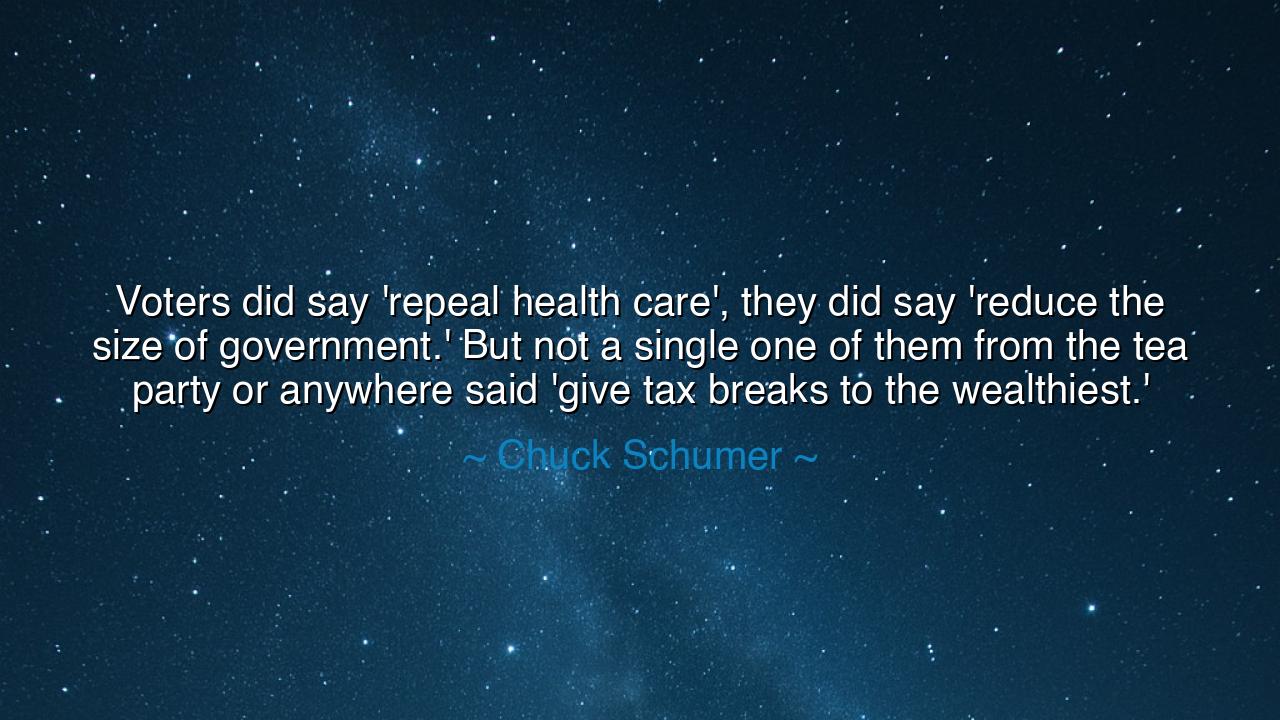
Voters did say 'repeal health care', they did say 'reduce the
Voters did say 'repeal health care', they did say 'reduce the size of government.' But not a single one of them from the tea party or anywhere said 'give tax breaks to the wealthiest.'






In the great marketplace of democracy, where the voices of many rise like the roar of an ocean, the words of Chuck Schumer echo as both reminder and warning: “Voters did say ‘repeal health care,’ they did say ‘reduce the size of government.’ But not a single one of them from the tea party or anywhere said ‘give tax breaks to the wealthiest.’” His words pierce through the noise of politics and ambition to reveal an eternal truth: that power, when detached from the will of the people, becomes corruption in disguise. The quote is born not merely from a moment in American debate, but from the timeless struggle between justice and privilege, between the many and the few.
In every age, there are those who seek to cloak greed in the garments of good intent. They speak of freedom but mean license for the powerful; they speak of reform but act for enrichment. Schumer’s words, uttered in a time of partisan fire, stand as a defense of the common spirit—the belief that the people’s voice must not be twisted to serve the ambitions of the elite. The voters, he reminds us, called for change, for fairness, for a humbler government that serves, not rules. Yet their cries were not for the lifting of burdens from the mighty, but for the lifting of burdens from the weary.
So it has ever been. When the Roman Republic began to decay, senators too forgot the farmers and soldiers who had built the empire with their hands. They granted favor upon favor to the patricians, believing themselves wise and eternal. But when the cries of the plebeians went unanswered, when wealth grew fat and justice thin, the republic crumbled, and tyranny filled the void. History, then, is not silent—it whispers through Schumer’s words, warning those who would forget that governance without compassion is a kingdom built on sand.
Even in more recent times, the same lesson has echoed. In the years following the Great Depression, nations learned that to restore balance, one must not feed only the towers of wealth, but also the roots—the workers, the dreamers, the everyday souls whose labor is the pulse of society. Franklin Roosevelt knew this truth when he shaped the New Deal. He sought not to punish prosperity, but to ensure that prosperity served the people. The voice of the people, he believed, was not a tool to be used, but a sacred trust to be honored.
Schumer’s words, then, are not a cry of partisanship, but a reminder of covenant—the covenant between those who lead and those who lend them power. For when a people speak, their voice carries the weight of hope and hunger, of fear and faith. It must not be distorted by those who would trade their trust for gain. To reduce the size of government is one thing; to reduce the reach of justice is another. To repeal laws may restore liberty, but to repeal compassion is to tear the soul from a nation.
Therefore, let this teaching be heard by all who seek to rule: never mistake the silence of the poor for consent, nor the noise of the rich for wisdom. The true strength of a nation is not measured in its towers, nor its treasuries, but in the fairness of its laws and the dignity of its people. The wealthiest may have their mansions, but if the masses have no voice, those mansions will one day stand in shadow.
And so, to the listener, take this lesson to heart. When you cast your vote, when you speak in the public square, when you stand for what is right—remember that democracy is a living flame. It must be tended with truth, fed with justice, and guarded against the winds of deception. Demand not gifts for the few, but fairness for all. For when the people’s will is clear and their leaders are true, the republic endures like stone before the storm.
Thus, the words of Chuck Schumer shall not fade with time. They shall stand among the ancient truths: that the will of the people must never be twisted to favor the powerful, and that the purpose of government, great or small, is not to exalt the few—but to lift the many.






AAdministratorAdministrator
Welcome, honored guests. Please leave a comment, we will respond soon